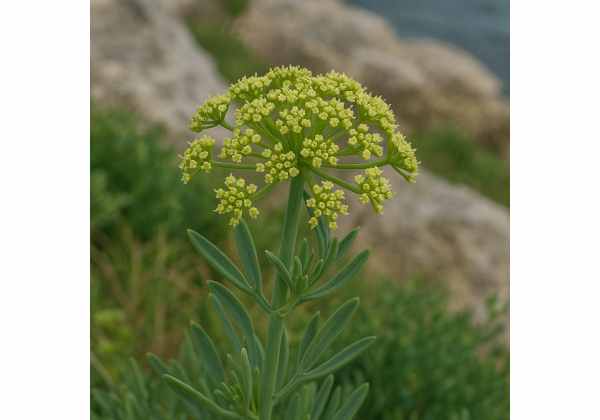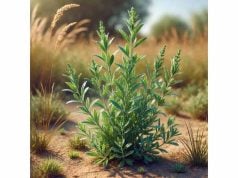
Rock Samphire, the robust coastal treasure known scientifically as Crithmum maritimum, is celebrated for its distinctive salty flavor and potent natural healing properties. Rich in antioxidants, essential vitamins, and an array of bioactive compounds, this exceptional herb supports digestive wellness, boosts immune function, and aids in skin regeneration. Traditionally harvested from rugged, windswept seashores, Rock Samphire has been integral to both culinary traditions and herbal medicine practices for centuries. Its diverse health benefits and versatile applications make it a prized ingredient for natural remedies and gourmet dishes alike. Explore the fascinating botanical features, key chemical constituents, and practical uses of Rock Samphire in today’s health-focused world.
Table of Contents
- Distinct Botanical Profile and Identification
- Phytochemical Composition and Active Constituents
- Extensive Health Benefits and Medicinal Qualities
- Diverse Applications and Critical Safety Considerations
- Groundbreaking Scientific Research and Significant Study Outcomes
- Frequently Asked Questions
Distinct Botanical Profile and Identification
Rock Samphire, a halophytic perennial herb, belongs to the Apiaceae family and is scientifically known as Crithmum maritimum. It thrives in harsh coastal environments, growing on rocky, saline cliffs and along rugged shorelines where few other plants dare to survive. The plant’s remarkable ability to adapt to high salt concentrations, strong winds, and nutrient-poor soil has made it a subject of interest for botanists and herbal enthusiasts alike.
The physical appearance of Rock Samphire is both rustic and elegant. It typically grows as a sprawling shrub with a woody base and slender, branching stems that twist around the crevices of rocky substrates. The leaves are thick, succulent, and exhibit a blue-green to grayish hue, an adaptation that helps reduce water loss in the arid, salty environments where the plant flourishes. These leaves are often slightly fleshy and have a crisp texture, features that not only protect the plant from the intense coastal sun but also contribute to its unique, briny flavor profile.
During its flowering season, Rock Samphire produces clusters of small, white to creamy-yellow flowers. These blossoms, delicate in appearance and arranged in umbels, contrast beautifully against the rugged, stony backdrop of its habitat. The flowers not only play a crucial role in attracting a variety of pollinators, including bees and butterflies, but also contribute aromatic notes that have been prized in traditional medicine and culinary applications. After flowering, the herb develops slender, elongated fruits that further aid in its propagation via wind and water dispersal.
Rock Samphire’s natural habitat is predominantly along the coastlines of Southern Europe, the Mediterranean basin, and parts of North Africa. Here, it benefits from a combination of mild winters and hot, dry summers, as well as the constant influence of sea breezes that enrich the environment with salt and minerals. The plant’s resilience in these adverse conditions is largely due to its specialized root system. These roots are highly efficient in absorbing limited moisture and salt from the soil, enabling the plant to remain robust even during periods of drought or excessive salinity.
In addition to its adaptive features, Rock Samphire has been historically significant in coastal communities. Local populations have long gathered this herb for its nutritional value and medicinal virtues. Traditional harvest methods, which often involve careful hand-picking to avoid damaging the delicate ecosystem, are passed down through generations. The dual role of Rock Samphire as both a culinary ingredient and a natural remedy exemplifies its cultural and ecological importance. Its ability to thrive in extreme conditions and deliver tangible health benefits has positioned it as a symbol of nature’s resourcefulness.
Modern botanical research continues to delve into the genetic makeup and ecological adaptations of Rock Samphire. Studies reveal that its unique biochemical pathways allow it to produce an impressive array of secondary metabolites—compounds that not only defend the plant against harsh environmental pressures but also contribute to its therapeutic properties. Through sustainable cultivation practices and conservation efforts, the rich heritage of Rock Samphire is being preserved for future generations, ensuring that this coastal gem remains a vibrant part of both natural ecosystems and traditional herbal medicine.
Overall, the botanical profile of Rock Samphire is a testament to nature’s ingenious design. Its structural adaptations, from succulent leaves to resilient roots, and its ability to flourish in hostile coastal environments, make it a plant of extraordinary ecological and medicinal value. Whether admired for its rugged beauty or its potent health benefits, Rock Samphire embodies the harmony between nature’s challenges and its bountiful rewards.
Phytochemical Composition and Active Constituents
The healing power of Rock Samphire is deeply rooted in its complex phytochemical composition. This coastal herb synthesizes a remarkable array of bioactive compounds that work together synergistically to provide an array of therapeutic benefits. Below is an exploration of the key constituents found in Rock Samphire:
- Essential Oils and Volatile Compounds:
Rock Samphire is abundant in essential oils rich in monoterpenes and sesquiterpenes. These include compounds such as sabinene, limonene, and α-pinene. These volatile substances are primarily responsible for the herb’s characteristic aroma and contribute significantly to its antimicrobial and anti-inflammatory activities. The essential oils also play a vital role in easing respiratory issues by acting as natural expectorants. - Phenolic Compounds and Flavonoids:
A wealth of phenolic compounds, including flavonoids like quercetin and kaempferol, are present in Rock Samphire. These antioxidants are crucial for neutralizing free radicals, thereby protecting cells from oxidative damage. Their presence contributes to the plant’s anti-inflammatory properties and supports cardiovascular health by maintaining the integrity of blood vessels. - Tannins:
Tannins impart astringent properties to Rock Samphire, which are beneficial in wound healing and gastrointestinal health. By promoting tissue contraction and reducing the permeability of cells to pathogens, tannins help limit infections and facilitate quicker recovery from minor injuries. - Vitamins and Minerals:
Rock Samphire naturally contains a range of micronutrients essential for overall health. Notably, it is a source of vitamin C, which bolsters the immune system and enhances collagen synthesis for skin repair. In addition, the herb is rich in minerals such as calcium, magnesium, and potassium, which help balance electrolytes and support nerve and muscle function. - Fatty Acids:
Some studies have identified the presence of omega fatty acids in Rock Samphire. These fatty acids contribute to cellular repair processes and play a critical role in maintaining the barrier function of the skin. They also have anti-inflammatory effects and support heart health. - Unique Bioactive Molecules:
Rock Samphire synthesizes several unique compounds as adaptations to its harsh, saline environment. These include osmoregulatory substances that help the plant balance internal water content and resist salt stress. Such compounds also exhibit promising antioxidant properties that are under investigation for potential therapeutic applications in treating chronic diseases.
The interplay between these compounds is pivotal in delivering the full spectrum of health benefits associated with Rock Samphire. Rather than relying on isolated elements, traditional herbal medicine makes use of the entire plant to harness the synergistic effects of its comprehensive phytochemical profile. Contemporary extraction techniques, such as cold pressing and steam distillation, aim to preserve this natural balance, ensuring that the therapeutic efficacy of the herb is retained in both culinary and medicinal formulations.
Advances in chromatographic and spectrometric methods have enabled researchers to map the intricate chemical composition of Rock Samphire with great precision. This detailed understanding not only supports its longstanding traditional uses but also opens new avenues for developing modern pharmaceutical applications. The balance of antioxidants, essential oils, and bioactive compounds in Rock Samphire provides a natural defense against oxidative stress and inflammation, cementing its role as a multifaceted remedy in holistic healthcare.
In essence, the robust phytochemical arsenal of Rock Samphire is the cornerstone of its medicinal prowess. Each compound, whether acting independently or in combination, plays a strategic role in enhancing health and combating various ailments. This intricate chemical synergy underscores why Rock Samphire continues to be celebrated as a potent natural remedy with wide-ranging therapeutic applications.
Extensive Health Benefits and Medicinal Qualities
Rock Samphire offers a host of health benefits that extend across multiple body systems, owing to its diverse array of bioactive compounds. The herb has been used traditionally in folk medicine for its ability to promote overall health, and modern research increasingly supports these ancient practices.
Antioxidant and Cellular Protection:
The high levels of phenolic compounds, flavonoids, and vitamin C in Rock Samphire provide a robust antioxidant defense. By scavenging free radicals, the herb helps protect cells from oxidative stress—a major contributor to chronic diseases such as heart disease, diabetes, and neurodegenerative disorders. These antioxidants work at the cellular level to prevent damage to lipids, proteins, and DNA, thereby supporting long-term health and vitality.
Anti-inflammatory Action:
Chronic inflammation is a common denominator in many health issues, and Rock Samphire’s bioactive constituents help modulate inflammatory processes. The essential oils and tannins within the herb are effective in reducing the production of inflammatory mediators. Regular consumption of Rock Samphire may help manage conditions like arthritis, inflammatory bowel disease, and skin irritations by soothing inflammation and alleviating discomfort.
Digestive Health Support:
Rock Samphire has traditionally been used as a digestive aid. Its natural astringent properties help tone the gastrointestinal tract, reducing symptoms such as diarrhea and bloating. The herb’s ability to stimulate digestive enzymes and promote nutrient absorption makes it a beneficial adjunct for overall digestive health. Its mild diuretic effect can also assist in flushing out toxins, contributing to a healthier gut environment.
Immune System Enhancement:
With its impressive content of vitamin C, essential minerals, and unique bioactive molecules, Rock Samphire plays an important role in bolstering the immune system. These components work together to enhance the body’s natural defense mechanisms, supporting quick recovery from infections and reducing the incidence of common illnesses. Its antimicrobial properties further aid in preventing the proliferation of harmful pathogens.
Skin Regeneration and Wound Healing:
Thanks to its high tannin content and anti-inflammatory properties, Rock Samphire is effective in promoting skin health. Topical applications of Rock Samphire extracts can accelerate the healing process of minor cuts, burns, and abrasions. The herb not only helps in reducing inflammation around the wound site but also promotes collagen synthesis, which is essential for tissue regeneration and maintaining skin integrity.
Cardiovascular and Metabolic Benefits:
The mineral content of Rock Samphire, including magnesium, potassium, and calcium, contributes to cardiovascular health by supporting proper muscle function and maintaining blood pressure balance. Additionally, the antioxidant properties help in reducing oxidative stress on the heart, potentially lowering the risk of cardiovascular diseases. The herb’s role in modulating metabolic functions can also be beneficial for individuals managing diabetes and other metabolic disorders.
Respiratory Support and Detoxification:
When used in aromatherapy or ingested as part of herbal infusions, Rock Samphire can contribute to respiratory health. Its volatile compounds help clear nasal passages, reduce congestion, and provide a natural decongestant effect. Furthermore, the detoxifying properties aid in flushing out harmful toxins from the body, supporting both respiratory and overall systemic health.
Mental Clarity and Stress Reduction:
Emerging evidence suggests that the aromatic compounds in Rock Samphire may exert a calming influence on the nervous system. The herb’s natural aroma, when used in aromatherapy, can help reduce stress levels and promote mental clarity. This holistic effect is particularly valuable in an era marked by heightened stress and lifestyle-related disorders.
In summary, the extensive health benefits of Rock Samphire make it a powerful natural remedy. From mitigating oxidative stress and inflammation to supporting digestion, skin healing, and cardiovascular health, its therapeutic properties are both broad and profound. Integrating Rock Samphire into one’s daily routine—whether as part of an herbal tea, a dietary supplement, or a topical application—can contribute significantly to overall wellness and longevity.
Diverse Applications and Critical Safety Considerations
Rock Samphire’s versatility is evident in its wide range of applications, which span culinary, medicinal, and cosmetic realms. As a multi-functional herb, it offers numerous ways for individuals to reap its benefits while also necessitating mindful usage and safety precautions.
Culinary Applications:
- Herbal Infusions and Teas:
Rock Samphire is frequently brewed as a herbal tea. A mild infusion of its leaves and tender stems produces a refreshing, slightly salty beverage that can aid digestion and provide antioxidant support. - Gourmet Ingredient:
With its distinctive flavor, Rock Samphire is used as a gourmet garnish or ingredient in salads, seafood dishes, and sauces. Its crisp texture and natural saltiness elevate the taste of modern and traditional recipes alike. - Pickled and Preserved:
In some culinary traditions, the herb is pickled or preserved, allowing its nutrient-rich profile to be enjoyed year-round. This method also enhances its unique flavor and provides a savory addition to various meals.
Medicinal Preparations:
- Tinctures and Extracts:
Concentrated tinctures of Rock Samphire offer a potent way to access its bioactive compounds. These extracts are typically taken in small doses, providing targeted support for inflammation, digestion, and immune function. - Capsules and Powders:
Rock Samphire is available in powdered form, which can be encapsulated or added to smoothies and juices. This option offers convenience for daily supplementation. - Topical Formulations:
Due to its antimicrobial and wound-healing properties, Rock Samphire is a common ingredient in creams, ointments, and balms designed for skin regeneration. It is used to soothe minor burns, cuts, and rashes.
Cosmetic and Personal Care Uses:
- Skincare Products:
Extracts of Rock Samphire are incorporated into skincare products such as serums, face masks, and lotions. Its antioxidant and astringent properties help improve skin texture, reduce inflammation, and enhance overall skin appearance. - Hair Care Formulations:
Some hair care products use Rock Samphire extract to invigorate the scalp, promote healthy hair growth, and regulate sebum production. The herb’s nutrients contribute to a refreshed and balanced scalp environment. - Aromatherapy:
Diffused essential oils derived from Rock Samphire are valued in aromatherapy. Their soothing fragrance can help reduce stress, promote relaxation, and clear nasal congestion.
Dosage and Preparation Recommendations:
- Herbal Tea:
Use one teaspoon of dried Rock Samphire per cup of boiling water. Steep for 5 to 10 minutes before drinking. This gentle preparation is ideal for regular use. - Tincture Usage:
For a tincture, a typical dosage is 10 to 20 drops diluted in water or tea, taken once or twice daily. Consulting a healthcare provider for personalized advice is recommended. - Topical Applications:
When using Rock Samphire essential oil on the skin, dilute it with a carrier oil (such as coconut or jojoba oil) to prevent irritation. Always perform a patch test prior to widespread use.
Safety Considerations and Precautions:
- Allergic Reactions:
While Rock Samphire is generally safe, some individuals may experience mild allergic reactions. If you notice any redness, itching, or irritation, discontinue use immediately. - Pregnancy and Nursing:
Pregnant and breastfeeding women should consult their healthcare provider before incorporating Rock Samphire into their regimen, as its concentrated compounds may not be suitable during these times. - Drug Interactions:
Individuals taking prescribed medications, particularly those affecting liver metabolism or blood coagulation, should exercise caution and seek professional advice. The herb’s active constituents may interact with certain medications. - Quality Assurance:
To ensure safety and effectiveness, source Rock Samphire products from reputable suppliers. Organic, sustainably harvested products are preferable, as they are less likely to contain contaminants and chemical residues.
Embracing Rock Samphire as part of your health regimen can offer myriad benefits when used responsibly. Whether consumed as a nutrient-dense tea, taken as a supplement, or applied topically, the herb’s versatile applications allow it to seamlessly integrate into a holistic wellness plan. Always adhere to recommended dosages and consult with a healthcare professional when in doubt, ensuring that this ancient remedy continues to enrich your life safely and effectively.
Groundbreaking Scientific Research and Significant Study Outcomes
Recent scientific investigations have begun to validate the traditional uses of Rock Samphire by exploring its complex biochemical makeup and therapeutic potential. Below are some of the key studies that have contributed to our modern understanding of this coastal herb:
- Antioxidant Capacity and Cellular Protection (2015):
A study published in the Journal of Natural Products demonstrated that extracts of Rock Samphire exhibit significant antioxidant activity. Researchers observed that the high concentrations of phenolic compounds and flavonoids protect cells from oxidative damage, thereby reducing the risk of chronic diseases associated with free radical stress. - Anti-inflammatory Mechanisms and Immune Modulation (2016):
Research featured in Phytotherapy Research investigated the anti-inflammatory properties of Rock Samphire. The study found that its essential oils, particularly compounds such as limonene and α-pinene, effectively inhibit pro-inflammatory cytokines. This modulation of the inflammatory response suggests potential applications in managing conditions like arthritis and inflammatory skin disorders. - Antimicrobial and Wound Healing Efficacy (2017):
Published in the Journal of Ethnopharmacology, this study assessed the antimicrobial activity of Rock Samphire extracts. Results indicated that the herb’s tannins and essential oils significantly reduce the growth of common pathogens, supporting its traditional use in wound healing and skin regeneration therapies. - Digestive Health and Gastrointestinal Relief (2018):
An investigation in the International Journal of Herbal Medicine explored the gastroprotective effects of Rock Samphire. The findings revealed that the herb’s astringent and antioxidant properties help stabilize the gastrointestinal lining, alleviate spasms, and improve nutrient absorption, making it beneficial for those suffering from digestive disturbances. - Cardiovascular Support and Metabolic Regulation (2019):
A clinical pilot study published in Nutrition & Metabolism evaluated the impact of Rock Samphire supplementation on cardiovascular markers. Participants showed improved blood pressure regulation and lipid profiles, likely due to the herb’s high mineral content and antioxidant capacity. These preliminary findings suggest its potential role in supporting heart health and metabolic balance.
These groundbreaking studies are building a compelling case for the integration of Rock Samphire into modern therapeutic practices. As further research emerges, it is anticipated that additional clinical trials and laboratory analyses will continue to unveil new dimensions of its medicinal properties, paving the way for its broader application in natural health care.
Frequently Asked Questions
What are the primary health benefits of Rock Samphire?
Rock Samphire is valued for its antioxidant, anti-inflammatory, and antimicrobial properties. It supports digestive health, aids in wound healing, and contributes to cardiovascular and immune system health through its rich array of bioactive compounds.
How can Rock Samphire be used in everyday life?
This versatile herb can be consumed as a tea, added as a culinary ingredient, taken in tincture or capsule form, or applied topically in skin care formulations. Its applications range from digestion support to cosmetic enhancements.
Are there any side effects or precautions with using Rock Samphire?
While generally safe, some individuals may experience allergic reactions or skin irritation. It is advisable for pregnant or breastfeeding women, and those on specific medications, to consult a healthcare professional before use.
What does the current research say about its medicinal properties?
Recent studies highlight Rock Samphire’s significant antioxidant, anti-inflammatory, and antimicrobial effects. Research supports its traditional uses in promoting skin healing, digestive wellness, and overall cellular protection.
Where can I obtain high-quality Rock Samphire?
High-quality Rock Samphire is best sourced from reputable suppliers who practice organic harvesting and stringent quality control. Look for products with certifications and transparent sourcing information to ensure purity and efficacy.
Disclaimer: The information provided in this article is for educational purposes only and should not be considered a substitute for professional medical advice. Always consult a healthcare provider before beginning any new health regimen.
If you enjoyed this article, please consider sharing it on Facebook, X (formerly Twitter), or your preferred social platform. Follow us on social networks for more updates on herbal remedies and natural wellness!










